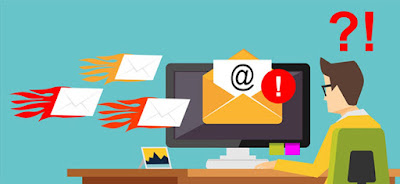WHAT IS EMAIL BOMBARDMENT?


Spyware although
it sounds like a James Bond contraption, it is actually a generic term for
malicious software that infects your computer or mobile device and collects
information about you, your browsing and your regular Internet use, as well as
other data. .
The result
is not surprising, since spyware works stealthily by making its way onto your
computer without your being aware or allowing it: it attaches itself to your
operating system in such a way that its presence on the infected computer is
assured. You may have inadvertently allowed spyware to install itself
automatically by agreeing to the terms and conditions of a harmless-looking
program you downloaded without reading the fine print.
Regardless
of how it invades your computer, spyware runs silently in the background,
collecting information or monitoring your activity to carry out malicious
actions that affect your computer and its use. This includes logging
screenshots, keystrokes, authentication credentials, personal email addresses,
data from online forms, Internet usage information, and other personal data,
such as credit card numbers.
And even if its unwanted presence is exposed, it does not have an easy uninstall function.
Spyware can
infect your system in the same way as any other malware:
Vulnerabilities Red Alert: Do not under any circumstances
click on an unknown link or suspicious file that has been attached to an email
and open an executable file or access an online program that downloads and
starts ("runs") an application . What's worse, sometimes just
visiting a malicious website and opening a page or ad banner is enough to cause
an inadvertent download. Other ways to infect your computer are to click an
option in a deceptive pop-up window or share software programs or documents
containing hidden spyware, including executable programs, music files, and
other documents, with friends. Just one click is enough.
Misleading marketing: It is the strategy of spyware
writers to present their spyware programs as highly useful tools that should be
downloaded. It can be an Internet accelerator, a new download manager, a hard
drive cleaning program, or an alternative web browser. Beware of these
"baits" as installing such programs could inadvertently give way to a
spyware infection. Furthermore, even if you finally uninstall the "useful"
tool responsible for the infection, the spyware persists and continues to work.
Software packages: Who doesn't like free software
(free software or freeware)? The only exception, when it comes to a host
program hiding a malicious plug-in, extension or plugin. What at first appears
a necessary component may actually be spyware, which remains active despite
having uninstalled the application that hid it.
Note- Trojans, worms, and backdoors often
infect the system with spyware, in addition to carrying out their main
malicious purpose.
Mobile device spyware: Mobile spyware has been around
since the use of mobile devices became widespread. Because mobile devices are
small and users cannot see everything that is running, these actions may
inadvertently take place in the background. Installing an application with
malicious code infects Mac and Android devices. These programs include
authentic applications with malicious code, malicious applications with false
names, and applications with false download links. Those responsible for these
threats can install them on mobile devices to control their victims without
their being aware.
Unlike other
types of malware, spyware writers do not target specific individuals or groups,
instead spyware attacks often launch a wide web to catch as many victims as
possible. That is why no one escapes the interest of spyware creators, since
even the smallest data can contribute to obtaining a buyer. For example,
spammers buy email addresses and passwords to develop malicious spam or other
forms of phishing. Spyware attacks to obtain financial information can empty
bank accounts or lead to fraudulent activities through legal accounts.
Information
obtained from stolen documents, images, videos or other files can even be used
for extortion purposes.
Ultimately,
no one is immune from spyware attacks, since those responsible for these
attacks do not care about the users they target, but about the information they
want to obtain from them.
What to do if computer is attacked?
If the
spyware infection meets the goal of its creators, it will remain invisible
unless you have the knowledge to know exactly where to look. Your computer
could be infected without raising suspicion. However, if you suspect that your
system has spyware, the first imperative is to make sure to remove it
immediately so as not to jeopardize the new passwords. To do this, purchase a
computer antivirus
program that ensures maximum protection and has tenacious spyware removal
technology to completely remove these infectious artifacts and restore affected
files and settings.
After you
have cleaned the system, contact your bank to advise of possible fraudulent
actions. The law requires in certain cases to notify the authorities about the
infractions committed or to make a public statement. These measures will depend
on the nature of the compromised information and on whether your system is
connected to other computers within a company or institution. If it is personal
information or the infringement involves the collection and transmission of
images, audio files and videos, it is recommended that you contact your local
authorities to report a possible violation of the law.
And last but
not least: many providers of phishing protection programs offer services to detect
fraudulent transactions or to freeze the credit account in order to avoid any
type of activity. There is no question that a credit freeze is a good idea.
Comments
Post a Comment